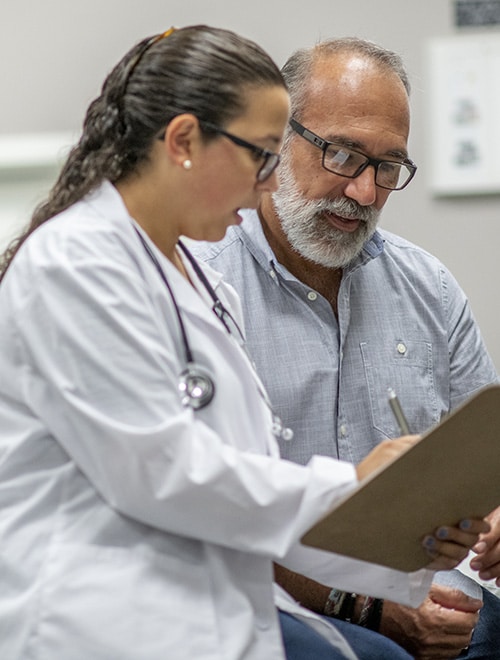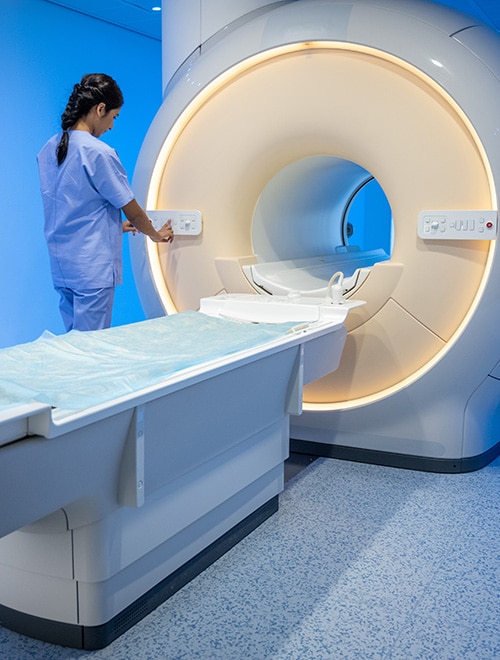- 8 min read
Your health care team
If you are reading this page, you have probably already encountered some of the different health professionals who are available to support you and your loved ones through the challenges of prostate cancer. These highly qualified individuals include your family doctor (general practitioner), medical specialists, nurses and many other healthcare providers. Together they form your healthcare team – also known as your multidisciplinary team. This team is involved in all stages of the prostate cancer experience from initial testing through diagnosis and treatment. They will also help you manage side effects of treatment and support you, your partner, family and/or friends to better manage any worries and concerns you may have.
This part of your toolkit provides you with a list of professionals that may be a part of your healthcare team and will help you understand their expertise and how they can support you throughout this experience.
Your medical team and their roles in prostate cancer
General Practitioner (GP)
This is your doctor that you normally see for your day-to-day health problems, the first person you see when you are sick and the one who provides referrals to other specialists, if necessary. Your GP can help coordinate your care and provide you and your loved ones with support and information to help you make informed choices about prostate cancer diagnosis and treatment.
Prostate Cancer Specialist Nurse also call PCFA nurses
PCFA nurses are experienced registered nurses who have received specialised training to provide support and assistance through all stages of prostate cancer. PCFA nurses are available via phone or in many hospitals and cancer centres across Australia. They can help you with evidence-based information, practical and emotional support, and can link you with local support networks.
If you have any questions or concerns, contact our Prostate Cancer Specialist Telenursing Service to speak with a specialist nurse.
Urologist
If you have any issues with your prostate gland you will be referred to a urologist. They are specialist doctors who treat diseases of the urinary tract and male reproductive system, including the kidney, bladder, prostate and testes. Urologists are experts in diagnosis and treatment of urinary problems, including biopsy of the prostate and prostate surgery.
Pathologist
Pathologists are health professionals who analyses your blood tests, including PSA tests. They also examine tissues under a microscope, such as biopsy samples, to diagnose cancer and assess the aggressiveness (grade – how quickly it will grow or spread) of a cancer.
Radiologist
Radiologists are specialists who perform your diagnostic scans, such as imaging tests.
Cancer Care Coordinator
This is a nurse who coordinates care and treatments for cancer. They can guide you and your family through cancer treatments and liaise with other care providers.
Continence Nurse
Continence Nurses are specialist nurses who help you manage any problems related to continence care (bladder and bowel problems) after treatment.
Urology Nurse
These are nurses who specialise in the urinary tract, including the bladder, kidney, and urethra. These nurses care for you if you have urinary issues such as urinary tract infections, cancer or if you undergo prostate surgery.
Men’s health physician
These are specialists in men’s health, including health checks and sexual health.
Medical Oncologist
Medial Onologists are specialist doctors who uses advanced drugs and medications (for example, hormone therapy and chemotherapy) to treat cancer.
Nuclear medicine physician
This is a doctor who uses radioactive substances to perform nuclear medicine scans, or sometimes treatment.
Radiation Oncologist
Specialist doctors who treat cancer using radiation therapy.
Palliative care specialist or palliative care nurse
Experts in pain and symptom control for advanced prostate cancer who work closely with your treatment team.
Allied health professionals and their roles
You may also see other allied health professionals. These are university qualified healthcare providers who are not doctors or nurses. They can help you with your recovery from prostate cancer symptoms, treatment and side effects, as well as benefiting your overall health and wellbeing and supporting you throughout the experience. To access these services, speak to a member of your healthcare team. Your GP, specialist doctors, nurses or PCFA Nurse can provide you with a referral to public or private services that may help you.
Examples of allied health professionals include:
Dietitian
An allied health professional who specialises in nutrition. They provide personalised nutrition advice and support including eating plans, advice on supplements and nutritional counselling. You can find out more about dietetics at: https://dietitiansaustralia.org.au/what-dietitansdo/
Exercise Physiologist
These health professionals provide tailored exercise plans to manage any symptoms or side effects from your prostate cancer treatment and improve how your body functions. They may provide health and physical activity information and support for lifestyle and behavioural changes. You can find out more about exercise physiology at: https://exerciseright.com.au/what-is-an-accredited-exercise-physiologist/
Fertility Counsellor
This type of counsellor specialises in helping people with fertility concerns and issues and can advise on fertility preservation options before starting treatments.
Genetics Counsellor
This is a health professional who has special training in medical genetics and counselling.
Occupational Therapist
This health professional provides support if you are having difficulty with everyday tasks and helps you maintain, regain or improve your independence. You can find out more about occupational therapy at: https://otaus.com.au/about/about-ot
Pharmacist
A healthcare professional who dispenses your medications and offers medication advice.
Physiotherapist
This is an allied health professional who specialises in movement and function of the body and advises on physical activities and pelvic floor training. They help strengthen your body, improve mobility and manage your pain after prostate cancer treatment using movement and exercise, manual therapy, education and advice. They can also help you strengthen your pelvic floor before prostate cancer surgery to help you better recover from the surgery. You can find out more about physiotherapy at: https://choose.physio/what-is-physio
Physiotherapist (Continence)
This is a continence physiotherapist who has received specialised training in managing problems related to continence (bladder and bowel) after treatment. They can also help you strengthen your pelvic floor before prostate cancer surgery.
Counsellor
These professionals provide strategies for decision-making, problem-solving, and can help you deal with the mental, emotional, social, and spiritual effects of cancer. PCFA has a team of counsellors available to support you, and your family, through the challenges of prostate cancer. Contact our nursing service: PCFA nurse.
Psychologist
Psychologists are allied health professional who provide emotional, spiritual and social support for you or your loved ones. They provide support and strategies to manage anxiety, depression and distress, and other psychological concerns related to cancer. You can find out more about psychology at: https://www.psychology.org.au/for-thepublic/about-psychology
Sex Therapist
Sex Therapists are professionals who provide you with therapy and relationship counselling individually, or with your partner, if you are dealing with intimacy or sexuality issues and relationship concerns.
Social Worker
These professionals offer counselling services, therapeutic interventions, and information and resources for you, and your family and carers to support decision making and help with accessing services and support. You can find out more about social work at: https://www.aasw.asn.au/information-for-the-community/information-for-the-community
My Wellbeing Plan
If you, your partner or a family member have been diagnosed with prostate cancer, a personal survivorship plan can help keep track of medical and allied health professionals in your healthcare team, along with a summary of information about diagnosis, treatment and ongoing care treatments.
My Wellbeing Plan
Download your copy of My Wellbeing Plan. Ask a PCFA nurse to help you fill out your plan.
You can take this plan with you to any future healthcare appointments so that any health providers involved in your current and future care have a clear picture of your diagnosis and treatment.
Key points
- Your healthcare team includes your different health experts and specialists involved in diagnosis, treatment and management of your cancer.
- You may have medical professionals and allied health professionals on your team.
- Allied health professionals are university qualified healthcare providers who are not doctors or nurses. They can help you with specific concerns and support your overall health and wellbeing.






